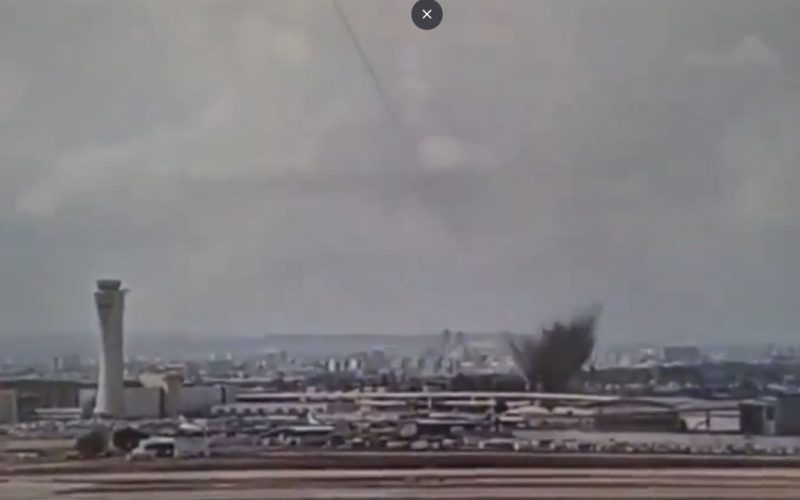Missile Penetrates Israel’s Defense Shield, Creating Airport Crisis
A ballistic missile launched by Yemen’s Houthi rebels penetrated Israel’s sophisticated multi-layered Air Defense systems on Sunday morning, striking within the perimeter of Ben Gurion International Airport. The missile landed near Terminal 3 around 9:35 AM local time (0635 GMT), creating a massive crater “several dozen meters wide and several dozen meters deep,” according to Yair Hezroni, central Israel’s police chief.
The attack, which the Houthis claimed was carried out using a hypersonic ballistic missile, marks the first time a projectile has directly struck inside the airport perimeter, an Israeli military spokesperson confirmed. The missile impact damaged a road and a vehicle near the terminal’s car park, with unverified footage showing a plume of black smoke rising from the impact site as drivers on nearby roads took cover.
Casualties and Immediate Response
Emergency services reported eight people sustained injuries in the attack, with two individuals requiring hospitalization for light to moderate wounds. Four people were injured due to the blast itself, while two others were hurt while rushing to shelters when sirens activated across central Israel.
“Security staff immediately asked hundreds of passengers to take shelter, some in bunkers,” reported witnesses at the scene. An AFP journalist inside the airport described hearing a “loud bang” with a “very strong reverberation” at the time of the strike.
The Israeli military acknowledged that both the advanced US THAAD system and Israel’s long-range Arrow defense system failed to intercept the missile despite “several attempts,” prompting an immediate investigation into this critical defense failure.
Airport Operations and Flight Disruptions
Ben Gurion Airport, Israel’s busiest international gateway, temporarily halted all flights following the attack. According to Udi Bar Oz, head of Ben Gurion Airport, operations resumed “less than 30 minutes after the missile hit,” but the incident triggered widespread disruption to international air travel.
Several major airlines quickly announced cancellations, including the entire Lufthansa Group (which encompasses ITA Airways and Brussels Airlines), Swiss International Air Lines, Air India, and Hungary’s budget carrier Wizz Air. Air India notably turned a mid-air flight back to New Delhi, while Air France emptied a plane of passengers that was set to depart Paris. Wizz Air announced a suspension of service to Israel until at least Tuesday, May 6.
Bar Oz stated that airport and Transportation Ministry officials were “providing information to carriers to minimize damage to flight schedules in the coming days,” though continued disruptions appear likely as airlines assess security concerns.
Israeli Leadership’s Vow of Retaliation
The attack prompted immediate and forceful responses from Israeli leadership. Prime Minister Benjamin Netanyahu, in a video message delivered in Hebrew, promised a multi-stage response against both the Houthis and Iran, which backs the Yemeni rebel group.
“We have acted against them in the past and we will act in the future… it will not happen in one bang, but there will be many bangs,” Netanyahu declared. He further stated that Israel would respond against the Houthis’ “Iranian terror masters” at a “time and place of our choosing,” directly implicating Tehran in the attack.
Defense Minister Israel Katz echoed this sentiment with a biblical allusion, stating, “Anyone who hits us, we will hit them seven times stronger,” referencing a concept from the Torah associated with severe punishment or divine justice.
Benny Gantz, leader of the Israeli Resilience party and a former member of the war cabinet, placed responsibility for the missile launch directly on Iran. “It is Iran that is firing ballistic missiles at the heart of Israel, and it must bear responsibility,” he posted on social media, warning of severe consequences for Tehran.
Houthi Claims and Regional Context
Yemen’s Houthi rebels quickly claimed responsibility for the attack. In a televised statement, Houthi military spokesperson Yahya Saree warned that Ben Gurion airport was “no longer safe for air travel” and cautioned international airlines against operating flights to Israel.
The Iran-backed group has been launching missiles and drones at Israel since the beginning of the Gaza conflict in October 2023, stating they act in solidarity with Palestinians. Sunday’s attack represents a significant escalation and success in their campaign, coming after numerous previous attempts were intercepted by Israeli defenses.
The Houthis have also been conducting attacks on ships in the Red Sea, significantly disrupting international maritime trade and prompting Western military responses led by the United States, with British assistance. These naval operations have forced the rerouting of global maritime traffic around Africa rather than using the shorter Suez Canal route.
Timing and Broader Implications
The missile strike occurred just hours before a scheduled meeting of Israel’s security cabinet that was expected to discuss a possible intensification of the war in Gaza. Palestinian militant groups Hamas and Islamic Jihad later issued statements praising the attack on the airport.
The successful strike raises serious questions about gaps in Israel’s air defense systems, which include the Iron Dome, David’s Sling, and Arrow systems designed to intercept threats at different ranges and altitudes. Military analysts suggest the missile’s hypersonic capabilities may have contributed to Israel’s failure to intercept it.
This attack represents a significant escalation in the ongoing regional conflict that began with Israel’s war in Gaza following the Hamas attack of October 7, 2023. According to Palestinian officials, more than 18 months of Israeli military operations in Gaza have resulted in at least 52,495 deaths, including 57 who reportedly died of starvation due to Israel’s siege of the territory.
As regional tensions escalate further, international diplomatic efforts to contain the widening conflict face mounting challenges, with Iran and its allied militias across the Middle East increasingly willing to directly challenge Israel’s security infrastructure.
The successful strike on Ben Gurion Airport demonstrates the Houthis’ expanding military capabilities and their determination to maintain pressure on Israel despite international efforts to curtail their activities. Meanwhile, Israel faces difficult decisions about how, when, and against whom to direct its promised retaliation in an already volatile regional environment.





